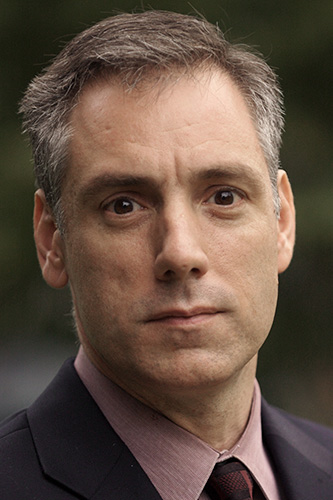

 Satellites make it possible for governments to provide essential services, such as national defense, navigation, and weather forecasting. Private ventures use satellites to offer highly desired services that include video program distribution, telecommunications, and Internet access. The Russian launch of a satellite, with nuclear power and the likely ability to disable satellites, underscores how satellites are quite vulnerable to both natural and manmade ruin. more
Satellites make it possible for governments to provide essential services, such as national defense, navigation, and weather forecasting. Private ventures use satellites to offer highly desired services that include video program distribution, telecommunications, and Internet access. The Russian launch of a satellite, with nuclear power and the likely ability to disable satellites, underscores how satellites are quite vulnerable to both natural and manmade ruin. more
 Last month, the Russian state-sponsored hacking group "Midnight Blizzard" gained access to the email accounts of Microsoft leadership, even exfiltrating documents and messages. The group reportedly used a simple brute-force style attack to access a forgotten test account and then exploited the permissions on that account to access the emails of employees in the cybersecurity and legal teams. more
Last month, the Russian state-sponsored hacking group "Midnight Blizzard" gained access to the email accounts of Microsoft leadership, even exfiltrating documents and messages. The group reportedly used a simple brute-force style attack to access a forgotten test account and then exploited the permissions on that account to access the emails of employees in the cybersecurity and legal teams. more
 On February 12–13, 2024, the first round of the final consultations for a Global Digital Compact (GDC) took place online and offline at the UN Headquarters in New York City. Around 50 governments and 50 speakers from non-governmental institutions took the floor. It was not really a dialog; it was a formal presentation of three-minute statements. more
On February 12–13, 2024, the first round of the final consultations for a Global Digital Compact (GDC) took place online and offline at the UN Headquarters in New York City. Around 50 governments and 50 speakers from non-governmental institutions took the floor. It was not really a dialog; it was a formal presentation of three-minute statements. more
 In the February 13th edition of the Wall Street Journal, Professor Thomas W. Hazlett offers a breathless endorsement of market concentration with the T-Mobile acquisition of Sprint, his go-to example. Apparently, mergers and acquisitions benefit consumers because they enhance competition and generate all sorts of positive outcomes that could not possibly have occurred but for the reduction in the number of industry players. more
In the February 13th edition of the Wall Street Journal, Professor Thomas W. Hazlett offers a breathless endorsement of market concentration with the T-Mobile acquisition of Sprint, his go-to example. Apparently, mergers and acquisitions benefit consumers because they enhance competition and generate all sorts of positive outcomes that could not possibly have occurred but for the reduction in the number of industry players. more
 An IPv4 address identifies your connection to the online world. IP addresses make it possible to host websites, manage secure communication, and engage in countless other essential, internet-related activities. Typically, when migrating to a new cloud provider, a business has only one path: lease the provider's IP addresses. But what if a business already has a block of IP addresses? more
An IPv4 address identifies your connection to the online world. IP addresses make it possible to host websites, manage secure communication, and engage in countless other essential, internet-related activities. Typically, when migrating to a new cloud provider, a business has only one path: lease the provider's IP addresses. But what if a business already has a block of IP addresses? more
 This blog post and the associated report aim to provide an overview of DNS Abuse 1related issues the Governmental Advisory Committee (GAC), part of the ICANN multi-stakeholder model, has identified. We also summarize the relevant community activity taking place to address these areas of interest and highlight remaining gaps. From 2016 to June 2023, the GAC referenced four primary categories of activity related to DNS Abuse. more
This blog post and the associated report aim to provide an overview of DNS Abuse 1related issues the Governmental Advisory Committee (GAC), part of the ICANN multi-stakeholder model, has identified. We also summarize the relevant community activity taking place to address these areas of interest and highlight remaining gaps. From 2016 to June 2023, the GAC referenced four primary categories of activity related to DNS Abuse. more
 The Internet Watch Foundation (IWF) leads the charge to combat child sexual abuse material (CSAM) online, and we at Public Interest Registry (PIR) are dedicated to supporting their efforts. We are honored to work with them across two important programs: Domain Alerts and TLD Hopping List. IWF services have been extremely successful in addressing CSAM on .ORG over the past five years more
The Internet Watch Foundation (IWF) leads the charge to combat child sexual abuse material (CSAM) online, and we at Public Interest Registry (PIR) are dedicated to supporting their efforts. We are honored to work with them across two important programs: Domain Alerts and TLD Hopping List. IWF services have been extremely successful in addressing CSAM on .ORG over the past five years more
 Recent coverage by CBS News on Channel 13 in Sacramento, California documented how AT&T had cut off landline telephone from 80-year-old Patricia Pereira in Camp Seco. She called at the beginning of 2023 to ask if landline service could be transferred from a neighboring home to hers. Instead of transferring the service, AT&T cut the copper lines dead on both properties. more
Recent coverage by CBS News on Channel 13 in Sacramento, California documented how AT&T had cut off landline telephone from 80-year-old Patricia Pereira in Camp Seco. She called at the beginning of 2023 to ask if landline service could be transferred from a neighboring home to hers. Instead of transferring the service, AT&T cut the copper lines dead on both properties. more
 Wolfgang Kleinwaechter, in his Internet Governance Outlook 2024, reminded us that 2024, as the years before and future years, will be pivotal for Internet Governance processes. We eagerly await Wolfgang's missives every January, and we trust what we read because we know him, and we trust CircleID. We should be grateful and cherish this example of straightforward, digitally enabled, and trust-based human communication... more
Wolfgang Kleinwaechter, in his Internet Governance Outlook 2024, reminded us that 2024, as the years before and future years, will be pivotal for Internet Governance processes. We eagerly await Wolfgang's missives every January, and we trust what we read because we know him, and we trust CircleID. We should be grateful and cherish this example of straightforward, digitally enabled, and trust-based human communication... more
 I work with a lot of ISPs that own rural fiber. Some rural network owners have been successful in providing fiber to cell sites near their networks over the last decade. A few sell directly to a cellular carrier, but most of these connections are sold to an intermediate carrier that bundles together cellular connections across a large geographic area. more
I work with a lot of ISPs that own rural fiber. Some rural network owners have been successful in providing fiber to cell sites near their networks over the last decade. A few sell directly to a cellular carrier, but most of these connections are sold to an intermediate carrier that bundles together cellular connections across a large geographic area. more
 Jay Fink had an interesting little business. If you lived in California, you could give him access to your email account; he'd look through the spam folder for spam that appeared to violate the state anti-spam law and give you a spreadsheet and a file of PDFs. You could then sue the spammers, and if you won, you'd give Fink part of the money as his fee. more
Jay Fink had an interesting little business. If you lived in California, you could give him access to your email account; he'd look through the spam folder for spam that appeared to violate the state anti-spam law and give you a spreadsheet and a file of PDFs. You could then sue the spammers, and if you won, you'd give Fink part of the money as his fee. more
 In two weeks, final negotiations will begin on the UN's proposed Cybercrime Convention, a document which has elicited widespread concern from civil society, industry groups, and some states due to the serious risks it poses to human rights, including privacy and freedom of expression. Since 2022, GPD and other groups, including EFF, Human Rights Watch and Privacy International, have sought to alert stakeholders within the process to the need for substantial revisions... more
In two weeks, final negotiations will begin on the UN's proposed Cybercrime Convention, a document which has elicited widespread concern from civil society, industry groups, and some states due to the serious risks it poses to human rights, including privacy and freedom of expression. Since 2022, GPD and other groups, including EFF, Human Rights Watch and Privacy International, have sought to alert stakeholders within the process to the need for substantial revisions... more
 In 2019, I wrote that Amazon would be a formidable satellite-ISP competitor. I still think so, but I didn't expect it would be over four years until they launched the first test satellites. In the meantime, SpaceX has put over 5,000 satellites in orbit and has over two million Starlink customers. Amazon has permission to launch 3,236 satellites. more
In 2019, I wrote that Amazon would be a formidable satellite-ISP competitor. I still think so, but I didn't expect it would be over four years until they launched the first test satellites. In the meantime, SpaceX has put over 5,000 satellites in orbit and has over two million Starlink customers. Amazon has permission to launch 3,236 satellites. more
 The 2024 "To-Do-List" for all stakeholders in the global Internet Governance Ecosystem is a very long one. Not only the real world but also the virtual world is in turmoil. Vint Cerf once argued that the Internet is just a mirror of the existing world. If the existing world is in trouble, the Internet world has a problem. more
The 2024 "To-Do-List" for all stakeholders in the global Internet Governance Ecosystem is a very long one. Not only the real world but also the virtual world is in turmoil. Vint Cerf once argued that the Internet is just a mirror of the existing world. If the existing world is in trouble, the Internet world has a problem. more
 This case had a bit of a weird result -- even though the brand owner had a mark that was 20 years old, and the alleged cybersquatter, in the meantime, acquired a domain name on the open market identical to that mark, because the domain name was first registered (by an unrelated party) before the brand owner's trademark rights arose, there was no relief under federal trademark law. more
This case had a bit of a weird result -- even though the brand owner had a mark that was 20 years old, and the alleged cybersquatter, in the meantime, acquired a domain name on the open market identical to that mark, because the domain name was first registered (by an unrelated party) before the brand owner's trademark rights arose, there was no relief under federal trademark law. more
Sponsored byVerisign

Sponsored byCSC

Sponsored byIPv4.Global

Sponsored byRadix

Sponsored byWhoisXML API

Sponsored byDNIB.com

Sponsored byVerisign
